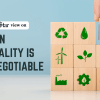Justice and finance at COP28

As governments are currently gathered in Dubai for this year's climate conference (being held till December 12), two things are painfully clear. First, we are already in a climate emergency. Second, the richer countries, especially the US, continue to turn their backs on the poorer countries. This year's debate, therefore, focuses on climate justice and financing: how to share the costs of climate disasters and the urgently needed transformation of the world's energy and land use systems?
The Dubai conference is the 28th annual Conference of the Parties of the UN Framework Convention on Climate Change, that is, COP28. The first COP was in Berlin in 1995. Our governments don't have much to show for their work. Back in 1995, they promised to stabilise the concentration of CO2 (carbon dioxide) and other greenhouse gases in the atmosphere "to avoid dangerous anthropogenic [human-caused] interference with the climate system." CO2 emissions that year were 29 billion tonnes, but this year are around 41 billion tonnes. Back then, atmospheric CO2 was 361 parts per million (ppm), but is now 419 ppm. Then, the Earth had warmed by around 0.7 degrees Celsius (°C) compared with the period of 1880-1920, but has now warmed by 1.2°C.
The rate of warming is also increasing. During 1970-2010, global warming was happening at a rate of around 0.18°C per decade. Now, Earth is warming by at least 0.27°C per decade. Within 10 years, we will hit the 1.5°C upper limit agreed on in Paris in 2016 (at COP21). In fact, we'll most likely break through that limit far sooner. As a result, the climate disasters are intensifying: floods, droughts, heatwaves, superstorms, megafires, and more are causing deaths, displacements, and hundreds of billions of dollars of damages each year, with losses of $275 billion estimated for 2022.
What we need to do is clear: shift from fossil fuels (coal, oil and natural gas) to zero carbon energy (wind, solar, hydro, geothermal, bioenergy and nuclear, depending on location). Countries need to interconnect their power grids with neighbours to diversify energy sources, thereby building resilience and lowering costs. We need to shift to electric vehicles and the production of hydrogen for industrial use. We need to end deforestation by raising the agricultural productivity of existing farms and managed forests.
These solutions are within reach, but there is no agreement yet on how to share the costs. There are three costs to consider. First are losses and damages from climate-related disasters. The second are costs of adapting to climate change, that is, the costs of "weather-proofing" society. The third are costs of overhauling the energy system.
When it comes to losses and damages and adaptation, those who caused the climate crisis should help to pay for those who are suffering but had little role in causing the crisis. That's simple justice. When it comes to overhauling the energy system, no country has the "right" to emit CO2, so all should share in the costs. Still, the poorer countries need access to low-cost, long-term financing.
Now here's the rub. The rich countries, and especially the US, so far refuse to accept their fair share responsibility for losses and damages and adaptation costs incurred by poorer countries. Nor have the rich countries taken practical actions to ensure that poorer countries have access to low-cost financing for the energy transition.
The US is responsible for roughly 25 percent of cumulative CO2 emissions since the start of industrialisation around 1750, even though the US constitutes just four percent of the world population. The US has emitted roughly 400 billion tonnes of CO2, or around 1,200 tonnes for each of today's 330 million people, while in poor African countries, cumulative emissions are roughly one-thousandth of the US rate (or, one to two tonnes per person). Nonetheless, US politicians brazenly recommend "voluntary" schemes to finance poorer countries—a transparent and rather pathetic ploy to shift responsibility away from the US.
If the rich countries were taxed just $0.10 per year for each tonne of cumulative emissions, the payment by the rich countries would be around $100 billion per year, with the US paying around $40 billion per year. In addition, the rich countries should be taxed around $4 for each tonne of new emissions, raising another $100 billion or so per year. The combined levies on past and current emissions would bring the total CO2 levies to around $200 billion per year, with the US share coming to around $60 billion.
The US will no doubt continue to kick and scream in order to deny such accountability. It will claim that paying around $60 billion a year for past and current emissions would be far too costly—even though it spends $1 trillion per year on the military. In fact, with an annual US GDP of around $26 trillion, a levy of $60 billion per year would equal just 0.2 percent of the US GDP.
I firmly believe that justice will come. World power is rebalancing between the rich and poor, and the ability of the richer world to evade responsibility is coming to an end. I believe that this rebalancing will lead to new forms of global taxation under the UN Charter (supervised by the UN General Assembly), including global levies on carbon emissions. Yes, this change will be a rude shock to rich countries that have long imposed their will on the rest of the world. Yet, the climate crisis is teaching us that we are in an interconnected world, where all countries must accept their responsibilities for past, present and future actions. This increasing awareness of interconnectedness and responsibility will be the path to justice and sustainable development for all.
Jeffrey D Sachs is university professor at Columbia University and president of the UN Sustainable Development Solutions Network.
Views expressed in this article are the author's own.
Follow The Daily Star Opinion on Facebook for the latest opinions, commentaries and analyses by experts and professionals. To contribute your article or letter to The Daily Star Opinion, see our guidelines for submission.

 For all latest news, follow The Daily Star's Google News channel.
For all latest news, follow The Daily Star's Google News channel. 










Comments